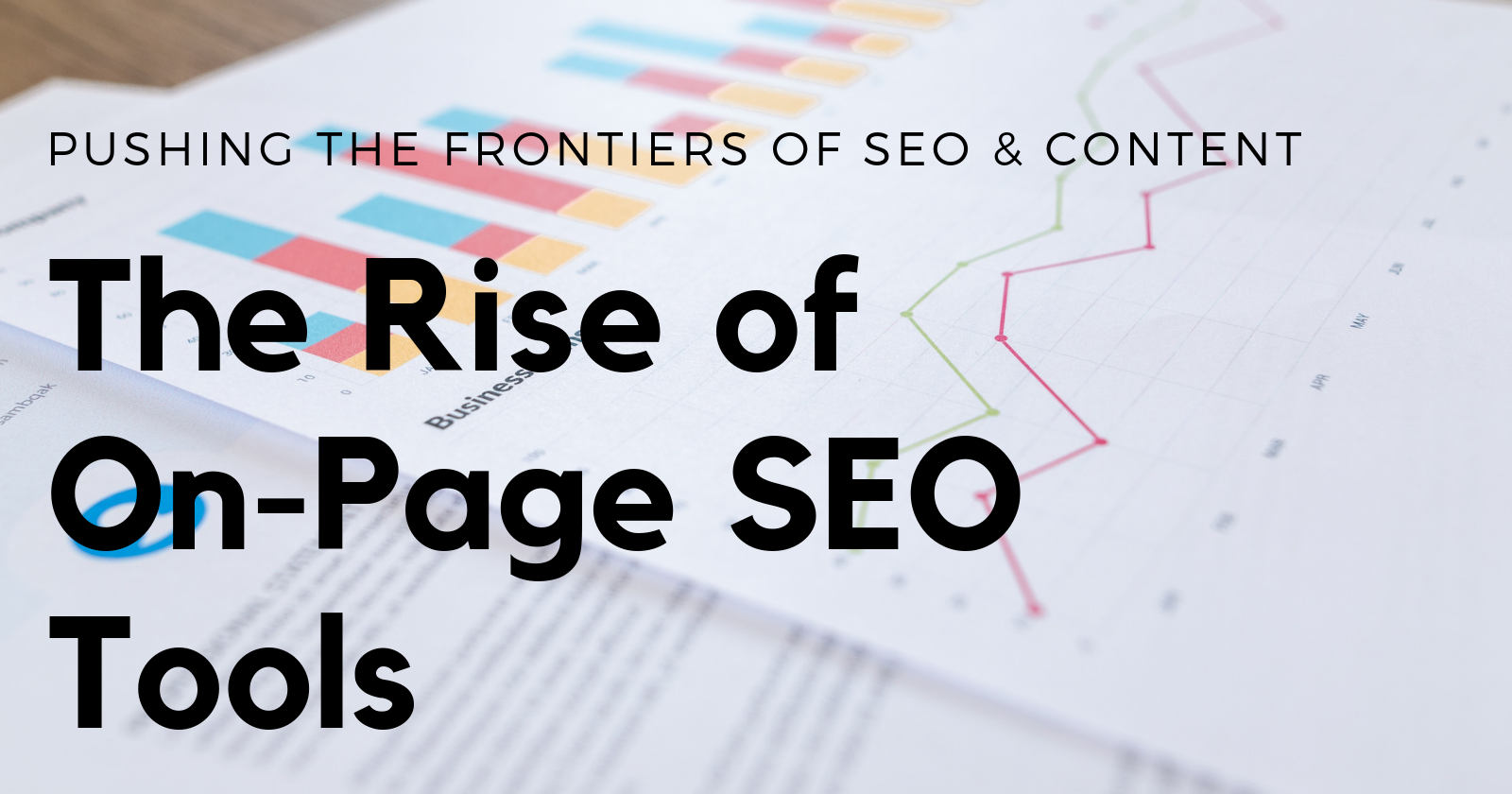Let’s talk content and on-page SEO — on steroids. Let’s talk about cutting-edge SEO research that can truly transform your ranking success.
Our discussions over the last few years have been focused on editorial plans, query intent, and user engagement.
While they are surely a part of the equation (and I am a deep believer of content quality, avoiding SEO spam and creating useful answers), we have forgotten an important part of getting content right: data-driven decisions.
I want to reinvent your definition of keyword difficulty. I want to reinvent your understanding of competitive analysis. It is time to truly leverage the latest SEO tools for your content creation.
Understanding Page 1 Is the Most Important Ingredient of SEO
Not all keywords are created equal.
Creating a blog post of 1,000 words is certainly a good SOP and an efficient way to brief your content writers. However, it is most likely not the right advice for the keyword for which you are trying to rank.
Different query types need different content. This means that Page 1 will look radically different whether you are looking for “SEO blog”, “buy CBD oil online” or “underground techno club Berlin”.
I want to invite you to study Page 1 and truly understand what content type, content length, and keyword frequency Google would like to see.
To achieve SEO success, your keyword research and content planning need an update.
Using Statistical Relevance to Understand Successful Websites
The last two years have seen a rise of tools that are doing keyword specific competitive research for you. Statistical analysis has never been easier — or faster.
New SEO tools use statistical analysis to understand what all those websites on Page 1 have in common – and for which ranking factors your website is deficient. You now get a list of statistical relevant optimizations to make.
The difference to a normal crawler (like Screaming Frog) is that the correlational SEO tools do not display a fixed set of hard-coded recommendations.
Their recommendations are based on the statistical relevance of a factor for your target keywords. It is specific, instead of the “one-size-fits-all” approach of most crawlers.
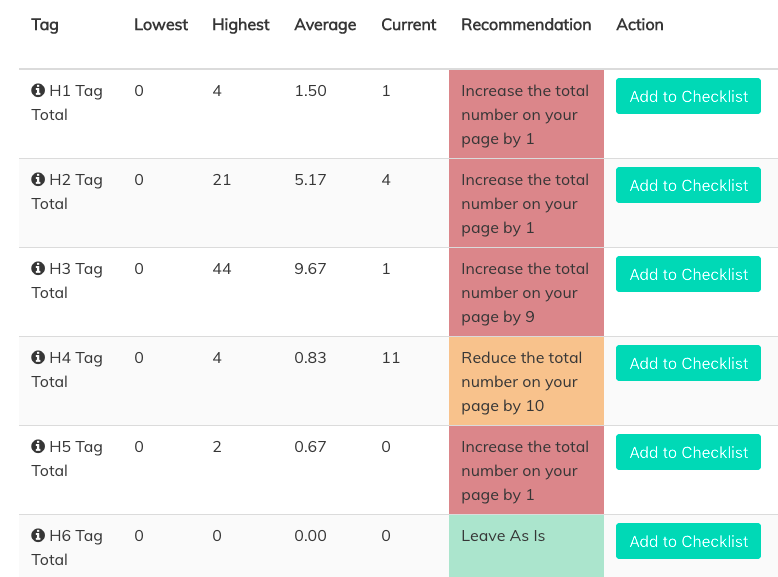 Page Optimizer Pro
Page Optimizer ProInstead of telling your team “extend this blog post”, you can now tell them: “Extend this piece by 383 words, two images and one video. Make sure to use the exact match keyword twice in H3 and add the following keywords…” – knowing that it will move the needle, because this is what those websites on Page 1 have in common.
The New Kids on the Blog: The Rise of On-Page SEO Tools
The tools rising in popularity include:
- CORA
- Page Optimizer Pro
- Website Auditor by SEO Power Suite
- SurferSEO
I am not an affiliate of any of these tools, and this analysis is based on my practice of using these tools in my agency work throughout the last two years.
These tools vary on the amount of search results and ranking factors they measure. Some measure a handful of on-page SEO factors, some review LSI keywords with TF-IDF analysis, others up to 600 ranking factors, including backlinks.
What to Consider When Implementing a New On-Page SEO Tool
There are three factors I like to consider when implementing a new tool to my workflow.
For correlational SEO, they are:
- Data and transparency
- Recommendation quality
- Usability
Think of all these tools as your most sophisticated keyword difficulty analysis ever.
If you believed in keyword density (percentage of keyword to total words within a page), it used to tell you “use the keyword more.”
Today’s tools not only tell you which specific ranking factors (headlines, images, bold, italics or lists) to optimize – they also tell you that those factors are most likely to have a positive impact on your rankings.
Data & Transparency
Firstly, CORA is the only tool that will not only review the first 100 search results (and therefore provide the deepest analysis of search results) but also show you the complete analysis. This includes every single website and the status of its optimization.
According to the SurferSEO website, they crawl the first 48 search results to make their on-page analysis.
SurferSEO and other tools will provide you with the recommendations but not the detailed report of your competitors. This means you won’t be able to reverse-engineer their math – and you will have to trust their recommendations without knowing the underlying data set.
CORA is also the only tool that measures more than 600 ranking factors. With CORA, you can even use APIs (e.g., to Ahrefs) and factor in backlinks (while the others are pure on-page SEO tools). It includes a unique in-depth task list which prioritizes the factors that appear to influence rankings the most.
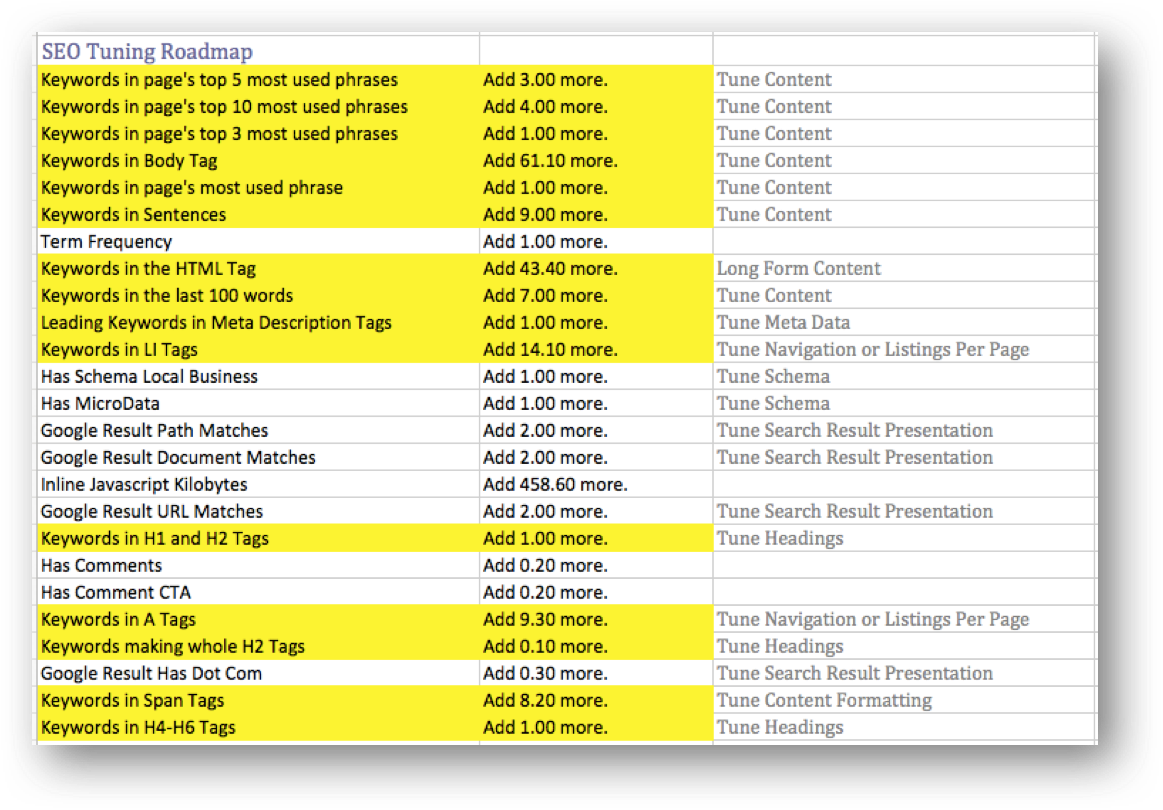 CORA
CORACORA is the clear winner when it comes to data provided and the number of ranking factors measured.
All other tools focus on on-page SEO factors only. Mainly, they are reviewing the term frequency of:
- The exact match keyword.
- Variations of the target keywords.
But unlike keyword density, they measure the term frequency per relevant ranking factor such as headlines, paragraphs, bold, italics, lists, etc.
SurferSEO uses around 10 factor types and operates more like a classic crawler with a fixed list of factors for which they are publishing recommendations.
It’s similar to this: Website Auditor reviews 17 on-page factors.
Page Optimizer Pro correlates 29 factors that are chosen based on SEO research and single variable testing. You can review the tests behind their displayed factors in their blog. It also includes functionalities to review page layout, media types, and schema markup.
All tools offer a solution for contextual keywords as well. Page Optimizer offers a TF-IDF analysis, as does Website Auditor. SurferSEO calls them “prominent words”.
Using semantically-related keywords will help to increase topical relevance and make it easier for other natural language processing tools (and therefore, most likely, also Google) to understand the intent, topic, and concepts of your content.
Many SEO professionals have seen an increase in rankings from using keyword variations and semantically-related keywords appropriately.
Recommendation Quality
When comparing the recommendations of several tools, you will realize that they never return the exact same recommendations.
Some will tell you to add a keyword 2x to an H3, and the others will tell you 3x. How can that be, and what does it mean for your optimization?
Disclaimer: Perfect is the enemy of done. We are aiming for “good enough.”
Correlation is not proof. However, it allows us to understand those factors that have the highest probability of making us successful.
The goal is not to get an “A” or 100 percent in all of the tools. The goal is to knock out those optimizations that will easily put us ahead of the curve.
 The first reason for different recommendations across tools is word count per page – and how it is calculated by the crawlers collecting HTML.
The first reason for different recommendations across tools is word count per page – and how it is calculated by the crawlers collecting HTML.
Crawlers such as Google (and these tools) review the source code of a website, not the visual front end that we enjoy as users.
This source code includes header, footer, body content, etc. The tools have different capacities of understanding raw HTML source code vs. rendering HTML.
Google indexes rendered content, so rendered solutions are more likely to be closer to what the Google crawlers are seeing, too.
CORA, for example, factors in all content, including header, footer and even developer comments by rendering HTML with embedded Chrome. SurferSEO claims to do the same.
However, Page Optimizer Pro determines the word count per page by rendering HTML with a simple browser. Their word count result is similar to the results of SEOquake by SEMrush.
Other tools might be using raw HTML only.
Keep in mind that all the tools also calculate variations of your keywords and synonyms, as well as match words differently. Comparing the variations across tools is often like comparing apples and oranges.
Secondly, the recommendations are based on the data set with which you are comparing your website.
When using Page Optimizer Pro or Website Auditor (as well as the creators), the recommendation is to compare against pages of the same type. Compare inner pages with inner pages (not homepages), and product pages with product pages (not categories) and so on.
This means that you are comparing your page against 5 to 10 competitors of the same page type that are more successful than you.
In contrast, CORA factors in the first 100 search results of all page types, SurferSEO compares 48 search results, and thus the recommendations are normalized across content types by the size of the data set.
This is especially interesting for the TF-IDF analysis. TF-IDF allows us to understand how to use contextual keywords (LSI). TF-IDF is term frequency (keyword count) in a document times the keywords used in the entire set.
In Website Auditor’s TF-IDF and Page Optimizer Pro, we are manually choosing the competitors that we want to compare our website against. Our manual decisions may negatively affect the result calculated.
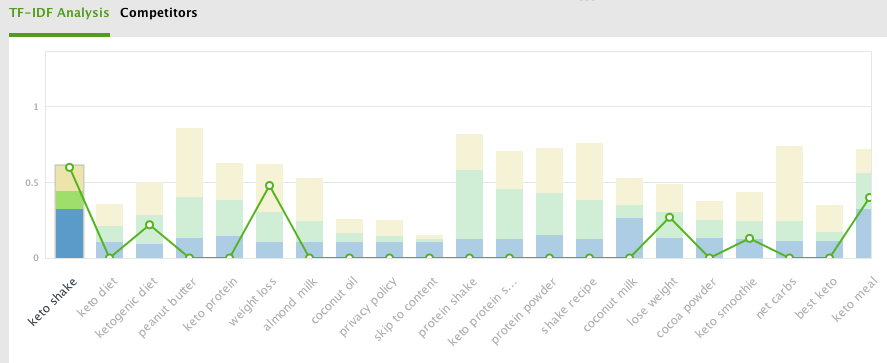 Website Auditor
Website AuditorThirdly, the quality of recommendations is based on the factors that are included in the tool – and how they are prioritized.
Most importantly, the recommendations differ across the tools based on the underlying assumptions that the creators made about the importance of certain ranking factors.
Using the different tools, we are buying into the different SEO philosophies of the creators:
Which ranking factors should be included in the tool? Which ones are relevant for SEO?
SurferSEO and Website Auditor hard-code their recommendations (more like most crawlers and SEO plugins would do) and thus will return the same set of factors no matter which keywords are entered. We are not aware of the reasoning behind the included factors.
Page Optimizer Pro also has a fixed set of recommendations. However, they were chosen based on years of single-variable testing by the creators and are updated regularly to reflect the importance of them based on the latest research.
CORA includes more than 600 ranking factors, even hypothetical ones, and has no preference on the importance of them. This means the recommendations are solely based on the statistical relevance and will change for every keyword.
On a continuum from personal preference of ranking factors to statistical analysis, we would find: Website Auditor and SurferSEO first, then Page Optimizer Pro and then CORA.
Usability
CORA is processing heavy and thus is a desktop application – as is Website Auditor (which is a website crawler with some great content tools). Page Optimizer Pro and SurferSEO are browser applications.
Website Auditor is my personal usability winner. It is fast, easy to use and intuitive. I can just plug in my domain, then the URL of the target page and keyword, and I will receive all the recommendations.
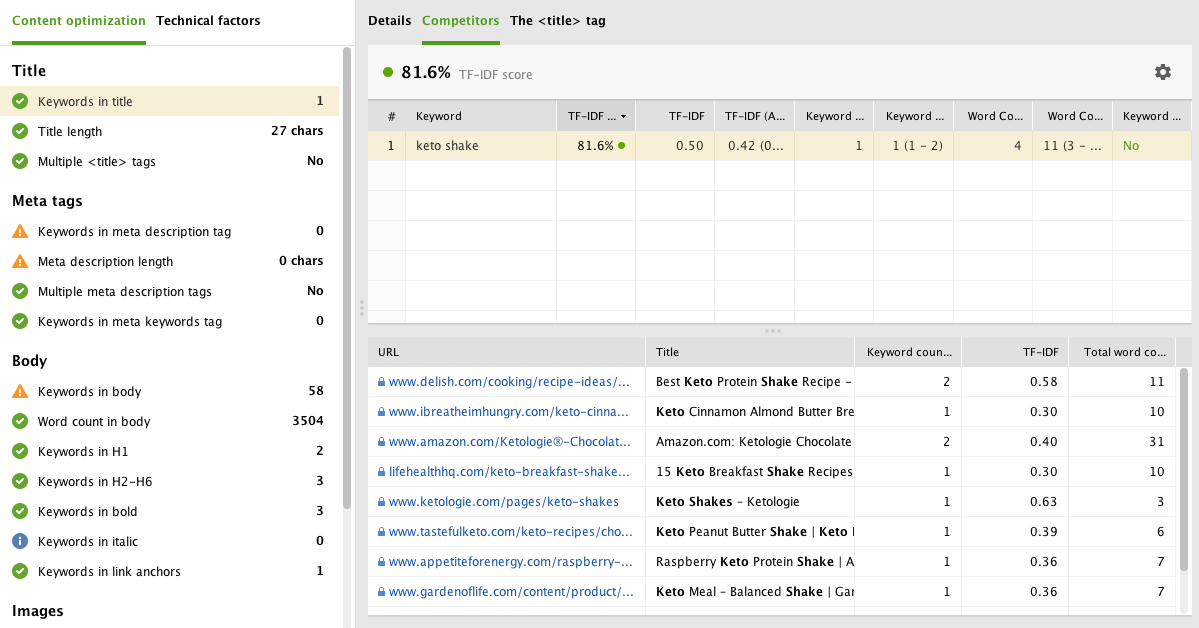 Website Auditor
Website AuditorIt is easy to see which competitors are being pulled in and include/exclude them from the analysis if needed (e.g., if they don’t have the same page type). I can plug several target keywords into the tool to get the complete analysis.
I work mostly with Website Auditor because I enjoy the process most.
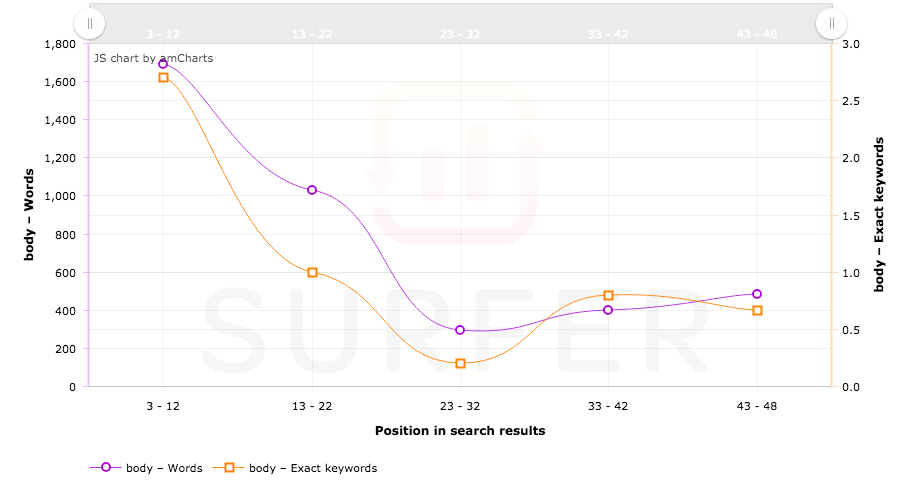 SurferSEO
SurferSEOThe second best tool in terms of usability, I would say, is SurferSEO. It is the flat white of SEO tools – a sexy browser version, minimalistic and slick.
It allows for a quick high-level analysis and understanding what a page would need. It also looks good on a screen share with clients because it does not have the nerdy SEO feel that some of the crawlers have.
SurferSEO is competing with Page Optimizer Pro for the second place in my personal usability preference. I like how Page Optimizer Pro gives an overall score that we can track over time and see improvements.
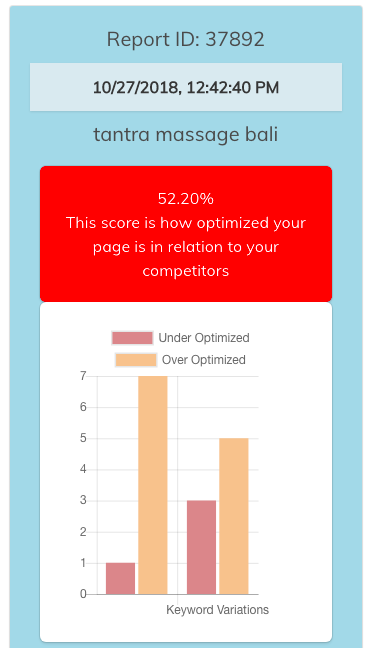 Page Optimizer Pro
Page Optimizer ProI also find Page Optimizer Pro most handy and useful to brief my content writers. It returns a list of recommendations, including word count, media items to use and how to optimize on-page SEO factors.
I can see how, with a bit of training, this tool can be used on a day-to-day basis by a content writer team with low to intermediate SEO knowledge.
While CORA offers the most insights, it will need a detailed-focused SEO expert to interpret the output. Many functions are not self-explanatory, and the huge Excel files can be overwhelming at first.

And the Winner Is…
We have looked at:
- Data and accuracy
- Quality of recommendations
- Usability
So, which one is the best on-page SEO tool?
The answer depends on your personal preferences, your role in the team, and for which part of your SEO process you are planning to use the tool.
It depends on your preference for:
- Detailed data vs. overview
- Statistical relevant recommendations vs. best case practices
- Complex in-depth reports vs. easy usage and practical implementation
For a high-level overview, screen shares on a client call and live presentations to the team or other stakeholders, I recommend SurferSEO or Website Auditor.
They will make you look good. You will be able to justify a data-driven strategy – without looking like a complete nerd. Those tools make it easy to sell your recommendations – because you want to believe them.
But don’t forget that we don’t have any insight into their data collection or the priority they assign to the displayed rankings factors.
They are correlational SEO for beginners (at least for now) or sales/marketing people who don’t want to dig into every detail.
If you want your SEO and content team to make data-driven decisions, precise on-page SEO updates and use contextual keywords efficiently, teach them how to use Website Auditor or Page Optimizer Pro.
Working with Page Optimizer Pro will allow you to future-proof your keyword research and content planning. Your content briefings and content upgrades will be more specific than ever before, leveraging ranking factors that have proven their relevance in a series of in-depth SEO testing.
Page Optimizer Pro (or POP as insiders call it) makes your content creation truly data-driven and helps you to understand what successful websites are doing right.
If you are working on complex SEO campaigns in competitive niches, or if you simply want to really geek out on ranking success in 2019, CORA is your best bet.
While it is hard to use, it offers by far the best data and deepest insight. It is the only tool that is fully transparent and creates a fluid task list based on statistical relevance only.
So, are you…
- An overview person trying to get an overview of the optimization needed for a page?
- An SEO pro creating detailed content plans?
- A writer looking to do on-page SEO right?
- Or an SEO expert trying to dive in deep?
In any case, I highly recommend that you rethink your keyword research, content planning, and content creation. SEO professionals are studying Page 1, identifying winning strategies, and using them to their advantage. You should be, too!
Correlational SEO and the testing community has been busting many SEO myths in the last few years.
Using tools like Page Optimizer Pro and CORA will teach you to take nothing for granted – until you have some data to back it up. You are learning to understand what is working, no matter how controversial it may seem.
Use the power of these new on-page SEO tools and create truly data-driven content.
Happy ranking!
More Resources:
- 5 On-Site SEO Factors That Matter Most
- Top 7 SEO Keyword Research Tools for Agencies
- A Guide to Essential SEO Tools for Agencies
Image Credits
In-post Photo #1: Pexels.com
In-post Photo#2: Pexels.com
All screenshots taken by author, March 2019

